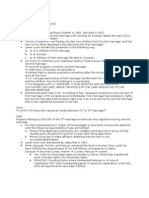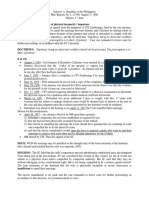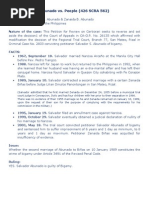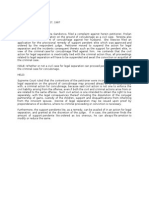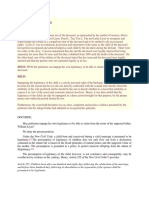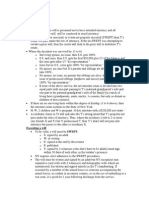PACETE Vs Carriaga
PACETE Vs Carriaga
Uploaded by
Jireh RaramaCopyright:
Available Formats
PACETE Vs Carriaga
PACETE Vs Carriaga
Uploaded by
Jireh RaramaOriginal Description:
Original Title
Copyright
Available Formats
Share this document
Did you find this document useful?
Is this content inappropriate?
Copyright:
Available Formats
PACETE Vs Carriaga
PACETE Vs Carriaga
Uploaded by
Jireh RaramaCopyright:
Available Formats
PACETE vs.
CARIAGA
231 SCRA 321
FACTS:
The issue in this petition for certiorari is whether or not the CFI of Cotabato, Branch I, gravely
abused its discretion in denying petitioners’ motion for extension of time to file their answer
and in declaring petitioners in default and in rendering its decision of which, among other
things, decreed the legal separation of petitioner Enrico L. Pacete and private respondent
Concepcion Alanis and held to be null and void ab initio the marriage of Enrico L. Pacete to
Clarita de la Concepcion.
Concepcion Alanis filed for the declaration of nullity of the marriage between her erstwhile
husband Enrico L. Pacete and one Clarita de la Concepcion, as well as for legal separation and
accounting and separation of property. She averred that she was married to Pacete on 30 April
1938 and they had a child named Consuelo. She learned that Pacete subsequently contracted a
second marriage with Clarita de la Concepcion. She and Pacete acquired vast property that he
fraudulently placed the several pieces of property either in his name and Clarita or in the names
of his children with Clarita and other “dummies;”
After having been summoned, the defendants repeatedly asked the court for extension of filing
for an answer which eventually resulted to being declared in default. Five months after the
petition was filed the court granted the issuance of a Decree of Legal Separation and declared the
properties in question as conjugal properties of Alanis and Pacete which were ordered forfeited
in favor of Alanis. The court also nullified his marriage to Clarita.
ISSUE:
Whether or not the court gravely abused its discretion in deciding the case.
HELD:
No defaults in actions for annulments of marriage or for legal separation. If the defendant in an
action for annulment of marriage or for legal separation fails to answer, the court shall order the
prosecuting attorney to investigate whether or not collusion between the parties exists, and if
there is no collusion, to intervene for the State in order to see to it that the evidence submitted is
not fabricated.
Article 103 of the Civil Code, now Article 58 of the Family Code, further mandates that an
action for legal separation must “in no case be tried before six months shall have elapsed since
the filing of the petition,” obviously in order to provide the parties a “cooling-off” period. In this
interim, the court should take steps toward getting the parties to reconcile.
The decision of the lower court was nullified.
You might also like
- Yasin V Sharia CourtDocument1 pageYasin V Sharia CourtPMV100% (1)
- People Vs ArchillaDocument5 pagesPeople Vs ArchillaDah Rin CavanNo ratings yet
- Vda de Delizo V DelizoDocument1 pageVda de Delizo V Delizofollowthefishies75% (4)
- Cervantes V FajardoDocument2 pagesCervantes V FajardoTedrick Danao100% (1)
- Pana V Heirs of Jose JuaniteDocument2 pagesPana V Heirs of Jose JuaniteJaye Querubin-Fernandez100% (6)
- Ty v. CA Case DigestDocument2 pagesTy v. CA Case DigestJamie Berry100% (2)
- 47.1 Borja-Manzano vs. Sanchez DigestDocument2 pages47.1 Borja-Manzano vs. Sanchez DigestEstel Tabumfama100% (3)
- Jones V HortiguelaDocument2 pagesJones V Hortiguelaapbuera100% (3)
- Liyao Vs LiyaoDocument2 pagesLiyao Vs LiyaoShimi FortunaNo ratings yet
- Acosta vs. PlanDocument1 pageAcosta vs. PlanAljenneth MicallerNo ratings yet
- Persons Case Digest FinalsDocument175 pagesPersons Case Digest FinalsKylee NavarroNo ratings yet
- Table - Property RegimesDocument17 pagesTable - Property RegimesEamydnic Yap0% (1)
- Pacete Vs CarriagaDocument1 pagePacete Vs CarriagaDoms ErodiasNo ratings yet
- Ocampo vs. FlorencianoDocument2 pagesOcampo vs. Florencianoneo paul100% (1)
- OCAMPO V FLORENCIANO DigestDocument2 pagesOCAMPO V FLORENCIANO DigestA M I R A100% (1)
- Jader Manalo V CamaisaDocument2 pagesJader Manalo V CamaisaSoc100% (1)
- Jimenez V Republic - DIGESTDocument1 pageJimenez V Republic - DIGESTKarez Martin100% (2)
- Hontiveros v. RTC (FAMCF)Document2 pagesHontiveros v. RTC (FAMCF)bluemode100% (1)
- Castillo Vs Deleon Castillo GR No. 189607Document2 pagesCastillo Vs Deleon Castillo GR No. 189607shopee online100% (2)
- Buccat V Mangonon de BuccatDocument1 pageBuccat V Mangonon de BuccatGabe RuaroNo ratings yet
- Persons - Docena v. Lapesura (Property Relations) GR 140153Document2 pagesPersons - Docena v. Lapesura (Property Relations) GR 140153Jeffrey Endrinal100% (1)
- Espiritu V Ca GR No. 115640, March 15, 1995 Facts:: PD JD2Document1 pageEspiritu V Ca GR No. 115640, March 15, 1995 Facts:: PD JD2Coffee 3694No ratings yet
- Lacson v. San Jose-Lacson DigestDocument2 pagesLacson v. San Jose-Lacson DigestJustin Paras67% (3)
- Lim vs. Lim, Et Al - GR No. 163209Document4 pagesLim vs. Lim, Et Al - GR No. 163209Lourd CellNo ratings yet
- Valdes V RTCDocument4 pagesValdes V RTCGlenda Mae GemalNo ratings yet
- 96.1 Tuason Vs CA Case DigestDocument2 pages96.1 Tuason Vs CA Case DigestEstel TabumfamaNo ratings yet
- Arriola vs. Arriola Case DigestDocument2 pagesArriola vs. Arriola Case DigestMAry Jovan Pangan100% (3)
- Rodriguez Vs CA, GR 85723Document2 pagesRodriguez Vs CA, GR 85723Jemika Kathryn Soledad-Tecson50% (2)
- Modequillo Vs Breva (PFR Case Digest)Document1 pageModequillo Vs Breva (PFR Case Digest)Ixhanie Cawal-oNo ratings yet
- Tuason V CaDocument1 pageTuason V CaCelinka ChunNo ratings yet
- Macadangdang vs. CA, 108 SCRA 314: Legal Separation. - If The Defendant in An Action For Annulment of MarriageDocument2 pagesMacadangdang vs. CA, 108 SCRA 314: Legal Separation. - If The Defendant in An Action For Annulment of MarriageMariana Jessa SerranoNo ratings yet
- 67.1 Chua V Cabangbang DigestDocument2 pages67.1 Chua V Cabangbang DigestEstel Tabumfama100% (1)
- KALAW V FERNANDEZDocument1 pageKALAW V FERNANDEZAnonymous 5MiN6I78I0No ratings yet
- Corpus v. Ochotorena DigestDocument2 pagesCorpus v. Ochotorena DigestConcon FabricanteNo ratings yet
- Case Digest PFR Subject Domingo v. Court of Appeals (GR No. 104818, 17 September 1993)Document2 pagesCase Digest PFR Subject Domingo v. Court of Appeals (GR No. 104818, 17 September 1993)Grandeur P. G. Guerrero100% (3)
- Abunado vs. People (426 SCRA 562)Document2 pagesAbunado vs. People (426 SCRA 562)PrinsesaJuu100% (1)
- Domingo Vs CADocument3 pagesDomingo Vs CAolofuzyatotz100% (1)
- David Vs CADocument1 pageDavid Vs CAcharmdelmo100% (3)
- In The Matter of The Adoption of Stephanie Nathy Astorga Garcia by Honorato B. Catindig, G.R. No. 148311. March 31, 2005Document2 pagesIn The Matter of The Adoption of Stephanie Nathy Astorga Garcia by Honorato B. Catindig, G.R. No. 148311. March 31, 2005Edgar Joshua TimbangNo ratings yet
- 5 Philippines vs. Ponce-PilapilDocument2 pages5 Philippines vs. Ponce-Pilapilmei atienza100% (2)
- Pintiano-Anno vs. AnnoDocument2 pagesPintiano-Anno vs. AnnoJoshua Ouano100% (1)
- Laperal-vs-KatigbakDocument1 pageLaperal-vs-KatigbakLei Jeus TaligatosNo ratings yet
- Gandionco Vs PenarandaDocument1 pageGandionco Vs PenarandaPio Guieb AguilarNo ratings yet
- Go-Bangayan v. BangayanDocument3 pagesGo-Bangayan v. BangayanSand Fajutag100% (1)
- Spouses de Mesa vs. Spouses AceroDocument2 pagesSpouses de Mesa vs. Spouses AceroAnonymous 96BXHnSzi100% (2)
- Ros V PNBDocument1 pageRos V PNBgel94No ratings yet
- (Digest) Republic v. CA & BobilesDocument2 pages(Digest) Republic v. CA & BobilesKarla BeeNo ratings yet
- De Ocampo v. FlorencianoDocument3 pagesDe Ocampo v. FlorencianoJayson YuzonNo ratings yet
- Aguilar Deserve Scant Consideration by This CourtDocument3 pagesAguilar Deserve Scant Consideration by This CourtKORINA NGALOY0% (1)
- Anaya Vs Palaroan - Case DigestDocument2 pagesAnaya Vs Palaroan - Case DigestWinnie Ann Daquil Lomosad100% (1)
- Arcaba Vs BatocaelDocument2 pagesArcaba Vs BatocaelJomar Teneza100% (2)
- Matabuena Vs CervantesDocument6 pagesMatabuena Vs Cervantesamun din100% (2)
- Case Digest For Eulogio VS BellDocument3 pagesCase Digest For Eulogio VS BellTiners50% (2)
- 15.1 Liyao Vs Tanhoti-Liyao DigestDocument2 pages15.1 Liyao Vs Tanhoti-Liyao DigestEstel TabumfamaNo ratings yet
- Matubis Vs PraxedesDocument1 pageMatubis Vs PraxedesDoms ErodiasNo ratings yet
- TOLENTINO vs. CA (Absolute Divorce)Document2 pagesTOLENTINO vs. CA (Absolute Divorce)Anonymous NqaBAyNo ratings yet
- Modequillo vs. BrevaDocument2 pagesModequillo vs. BrevaKaye MendozaNo ratings yet
- Pacete Vs CariagaDocument3 pagesPacete Vs CariagaJaylyn AmmangNo ratings yet
- Pacete Vs CariagaDocument1 pagePacete Vs CariagaJL A H-Dimaculangan100% (1)
- Pacete V Carriaga Case DigestDocument2 pagesPacete V Carriaga Case DigestPiaRuelaNo ratings yet
- Pacete V Cariaga Case DigestDocument1 pagePacete V Cariaga Case DigestTin LlenaresasNo ratings yet
- Vda. de Jacob v. CA, GR 135216, Aug. 19, 1999 DigestDocument3 pagesVda. de Jacob v. CA, GR 135216, Aug. 19, 1999 DigestJireh RaramaNo ratings yet
- SEC v. GMA, GR 164026, Dec. 23, 2008 DigestedDocument2 pagesSEC v. GMA, GR 164026, Dec. 23, 2008 DigestedJireh RaramaNo ratings yet
- Republic Vs Dayot DigestDocument1 pageRepublic Vs Dayot DigestJireh RaramaNo ratings yet
- Marbella-Bobis v. Bobis, GR 138509, July 31, 2000 DigestedDocument2 pagesMarbella-Bobis v. Bobis, GR 138509, July 31, 2000 DigestedJireh RaramaNo ratings yet
- Bernabe v. Alejo, GR 140500, Jan. 21, 2002 DigestedDocument3 pagesBernabe v. Alejo, GR 140500, Jan. 21, 2002 DigestedJireh Rarama100% (1)
- Mercedita Mata Aranes, Petitioner, vs. Judge Salvador M. Occiano, RespondentDocument2 pagesMercedita Mata Aranes, Petitioner, vs. Judge Salvador M. Occiano, RespondentJireh RaramaNo ratings yet
- C14 Department of Foreign Affairs Vs National Labor Relations Commission (NLRC) and Jose MagnayiDocument2 pagesC14 Department of Foreign Affairs Vs National Labor Relations Commission (NLRC) and Jose MagnayiJireh RaramaNo ratings yet
- Arranged MarriageDocument13 pagesArranged MarriageJimena GiselaNo ratings yet
- Misc Policies CoroDocument2 pagesMisc Policies CoroMuhammad Azhar ImranNo ratings yet
- Selfish Whining Monkeys - An ExtractDocument16 pagesSelfish Whining Monkeys - An Extract4th Estate BooksNo ratings yet
- Succession QuintosDocument9 pagesSuccession QuintosMariel FelizmenioNo ratings yet
- Position Paper On DivorceDocument4 pagesPosition Paper On Divorcejereka100% (2)
- Sample Wedding ProgrammeDocument8 pagesSample Wedding ProgrammeGj RilloNo ratings yet
- Family Law Sample ProjectDocument19 pagesFamily Law Sample ProjectSrishttiNo ratings yet
- Dela Cruz v. GarciaDocument5 pagesDela Cruz v. GarciaPia Aila MartinezNo ratings yet
- Vanity FairDocument2 pagesVanity FairPaula BeatriceNo ratings yet
- Divorce - Hindu Marriage ActDocument2 pagesDivorce - Hindu Marriage ActAnjani100% (1)
- Mnemonic WillsDocument11 pagesMnemonic WillsSamy M. HarmoushNo ratings yet
- Hindu Law Maintenance FinaleDocument23 pagesHindu Law Maintenance Finaletayyaba redaNo ratings yet
- Jardaleza Vs Jardaleza DigestDocument2 pagesJardaleza Vs Jardaleza DigestLouiegie Thomas San JuanNo ratings yet
- Tech ResultDocument13 pagesTech Resultarindamta1211010No ratings yet
- UntitledDocument13 pagesUntitledapi-23360423125% (4)
- 925Document3 pages925MayizNo ratings yet
- Bi Hawa MohamedDocument32 pagesBi Hawa MohamedMwambanga Mīkhā'ēl100% (1)
- LSDE December 22, 2021Document24 pagesLSDE December 22, 2021LeyteSamar DailyExpressNo ratings yet
- Family Judgment Law DiscussedDocument8 pagesFamily Judgment Law DiscussedMoving StepNo ratings yet
- The Filipino WomanDocument9 pagesThe Filipino WomanJocel palganNo ratings yet
- Notes in PFRDocument28 pagesNotes in PFRChaNo ratings yet
- Adjectives - Ed, - Ing, - LyDocument3 pagesAdjectives - Ed, - Ing, - LyLarisa Georgiana RotariuNo ratings yet
- 1979 Bar Exam SuccessionDocument3 pages1979 Bar Exam SuccessionAnonymous bOncqbp8yiNo ratings yet
- 2revocation To Disinheritance1Document7 pages2revocation To Disinheritance1Thalia SalvadorNo ratings yet
- MuslimDocument21 pagesMuslimKhushal kaleNo ratings yet
- Original Petition For Divorce With Children. 1st Step To Start 60 Day Cool Off PeriodDocument11 pagesOriginal Petition For Divorce With Children. 1st Step To Start 60 Day Cool Off PeriodshumitNo ratings yet
- Divorce EffectsDocument6 pagesDivorce Effectsapi-393568208No ratings yet
- Adolfo Vs AdolfoDocument1 pageAdolfo Vs AdolfoPinky Salvador100% (1)


